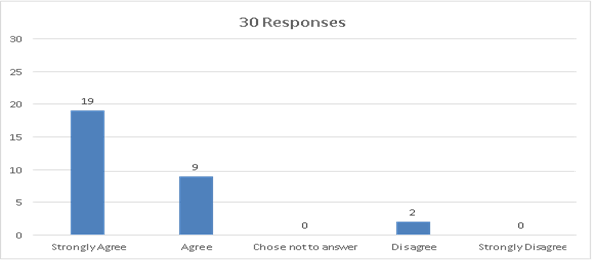
1.1 Introduction
Access to justice is one of the most constitutionally recognized human and fundamental rights and it applies not only to people seeking justice in court, but also to justice being served within a reasonable time, that is, easy access to justice by legal proceedings in a timely manner. The administration of justice should be impartial and non-discriminatory, and the state should take all necessary steps to provide fair, transparent, effective, and accountable services that promote equal access to justice for all. Legal aid programs are an important part of strategies to improve access to justice. It is essential today for not only the effectiveness of the rule of law but also for enhancing access to justice.
In the civil justice system, access to justice implies that a person must be able to become aware of her rights and exercise them through a formal or informal procedure that is impartial, non-discriminatory, and that establishes the facts, applies the rule of law, and upholds the decision. In Bangladesh, the supreme law of the territory indirectly emphasizes access to justice in several articles, such as Article 27 of the Bangladesh constitution, titled “Equality before Law,” which states that “Every citizen has a right to equal protection under the law and are entitled to equality before the law”. Article 31 further affirms that every citizen has an inalienable right to be protected by the law and to be treated in accordance with the law and Article 26 of the constitution reconfirms that any segment of law made in conflict with any fundamental right will be deemed void. Although no explicit definition of “access to justice” is provided, these articles discuss it indirectly.
Like many other human rights, the right to access to justice through the courts has been recognized as a universal human right in the Universal Declaration of Human Rights (UDHR). According to Article 6 of the UDHR, “Everyone has the right to recognition everywhere as a person before the law” and Article 7 of the UDHR states that “All are equal before the law and are entitled without any discrimination to equal protection of the law”. Access to justice is one of the most important goals of a democratic society, however, in Bangladesh, access to justice is not properly achieved due to a number of problems. Delays in the formal justice system have become one of the major barriers and women are deprived from their actual rights. Bangladeshi women have been fighting for their rights in the family, society, and state. Practically, in the society, women are often considered a burden. Especially for poor families, where women are at risk of marrying at a young age and where the practice of dowries, while illegal, persists and is burdensome. Women in Bangladesh are not well informed about their rights, and as a result, they face violence, abuse, and unequal treatment at home, at work, and in their larger communities, as well as being denied opportunities to learn, earn, and lead. Gender inequality is a major source of poverty and a fundamental violation of women’s rights. Women continue to bear a disproportionate share of the brunt of all forms of violence and discrimination in all aspects of life. True, there have been improvements in some areas and on certain issues: for example, in Saudi Arabia, women were granted the right to vote and run for office for the first time in 2015.
However, there has been little or no progress on other issues, such as insignificant reductions in cases of violence against women. Women continue to be paid less than men for doing the same work; there are still countries that have no laws against marital rape and allow child marriage; also, women are still subjected to female genital mutilation and “honour” killings. In Bangladesh, women are seen as not being particularly aware of their rights and that continues to remain an underlying assumption in society. The rights of women should be known by every woman. A person who understands the law does not need a weapon. Law is her most powerful weapon. This is especially true for women, who frequently face social and institutional barriers to accessing justice and finding appropriate legal solutions due to gender discrimination, social stigmas, a lack of knowledge of their rights, and economic and educational disadvantages.
Women’s access to justice is not a luxury; it is a fundamental human right related to human dignity. To ensure women’s access to justice, procedures must be in place to ensure non-discriminatory access to justice, and women must have effective access to remedies when their rights are violated.
1.2 Rationale of the study
To promote the empowerment of women as well as ensure women’s access to justice, this paper focuses on the relationship between the access to justice and the rights of women. In Bangladesh, women are always considered second-class citizens; also, procedural problems such as the defective judicial system, lengthy trial procedures and the absence of denationalization lead to women not getting a proper access to justice. Women’s access to justice is a legal and constitutional framework that guarantees women’s rights, but without education, knowledge, awareness of their rights, and the ability to make decisions, women are frequently unable to claim those rights, get legal assistance, or appear in court. That’s why they are being deprived of the rights that they should be entitled to.
1.3 Problem statement
Access to justice is one of the ways to ensure the empowerment of women, but in Bangladesh, women have less chance to enjoy their access to justice. They don’t have proper access to justice due to a lot of reasons that deprive them of the basic fundamental rights guaranteed by the Bangladeshi constitution, such as the equal protection of law and equality before the law. This study is conducted to focus on this particular significant issue as well as to find a way out of this situation.
1.4 Hypothesis
Access to justice is a fundamental right of all women. But due to a lot of drawbacks of the Bangladeshi legal system and the negative impact of traditional culture, the women of Bangladesh are deprived of this right. Improving awareness among women regarding their rights could be an effective route to ensure the right to access to justice of women of Bangladesh.
1.5 Scope of the study
According to the Bangladeshi constitution, we are all entitled to access to justice alongside other fundamental rights. These include the right to live free from violence and discrimination; to enjoy the highest attainable standard of physical and mental health; to be educated; to own property and to earn an equal wage. But in Bangladesh, women are deprived of their rights. Across the globe, many women still face discrimination on the basis of sex and gender. Gender inequality underpins many problems which disproportionately affect women such as domestic and sexual violence, lower pay, lack of access to education, and inadequate healthcare. This particular article will strive to focus on the protection of the rights of women to access justice and ensuring the equal rights of women, to make them confident enough to claim their rights.
1.6 Objectives
1.7 Study limits
The most significant obstacle to completing this study is a lack of available time. In addition, “Women’s rights and access to justice” is a topic that is constantly discussed, but there is no book from which we may learn about it. As a result, gathering resources regarding this particular issue in Bangladesh was a challenge.
1.8 Research questions
1) What is the relationship between access to justice and the rights of women?
2) What are the obstacles that are keeping women from enjoying their right to access to justice?
3) What steps should be taken to ensure the access to justice for women?
2.1 Literature Review
Women are consistently regarded as second-class citizens in Bangladesh. Due to procedural issues including an ineffective judicial system, a drawn-out legal process, and a lack of decentralization, women lack adequate access to justice. While women’s rights are protected by the legal and constitutional framework that ensures their access to justice, they are frequently unable to assert those rights, obtain legal representation, or appear in court without education, knowledge, awareness of their rights, and the capacity to make decisions.
To give the issue a voice, author Nadim Zawad Aki pointed out in his paper titled “Does Everyone Have Access to Justice?” that access to the justice system is key to redressing violations of human rights. In Bangladesh, women’s rights to access to justice, especially those of women in marginalised and disadvantaged situations, have been subject to numerous legal, social, institutional, and economic constraints. The high cost of the legal system restricts this section’s access to justice as well. Even while the cost of litigation may not be a major worry in industrialized nations, it is unavoidable in Bangladesh that the poor must bear the burden of paying for their attorneys’ fees, travel expenses, lost earnings, costs associated with gathering evidence, and other court charges.
Article 27 of the Constitution of Bangladesh contains provisions regarding equality before the law. On the other hand, Article 31 provides the equal protection of the law. Thus, the supreme law of the land ensures women’s right to access to justice.
Md Mustafizur Rahman writes in his paper that women remain a long way from living lives with complete autonomy and receiving equal treatment. Cultural and social customs continue to be characterized by a patriarchal and discriminating attitude toward women. Bangladeshi women only barely participate in profitable business activity or political initiatives due to a lack of sufficient education and skills. High dropout rates and poor educational quality continue to be key concerns despite commendable advancements in female education and gender equity in primary and secondary schools.
He further writes that, in rural regions, women and girls proceed to experience numerous healthcare deficits. Reports also show income gaps between men and women, despite the fact that this is against the law. In addition, it has been determined that government efforts to better the status of vulnerable women under diverse social safety net programs fall short of really addressing their requirements. Due to women’s historically low levels of political participation, these problems persist and still exist. Even while the situation is gradually becoming better, as evidenced by the rise of successful female candidates for elective office, it is still a difficult effort to guarantee sufficient and equitable involvement. It appears that much work needs to be done before women are fully empowered and included in developmental activities.
3.1. Method of Research
This present study combines both doctrinal analysis and empirical studies. The doctrinal aspect of the study has, as a starting point, delivered the stimulus through which the empirical investigation itself has provided the information on the basis of which the research has focused on the relationship between women’s rights and their access to justice. To minimize the gap between theory and practice, both qualitative and quantitative methodologies were applied in this research. The research retrieved both primary and secondary sources, revising the existing laws applicable to women in Bangladesh and academic annotations including reported and unreported judgements given by the lower and higher courts. It has been very problematic to accumulate these judgments from the lower courts of Dhaka as they had to be replicated from the original judgments of the courts. It was also tough to make those decisions reachable for this research, as not only they are confidential, but they are also typically in Bangla. However, an attempt has been made in this research to scrutinize the unreported decisions of the lower courts of Dhaka to provide a more comprehensive picture of the relationship between women’s rights and access to justice. Apart from this, to confirm the persistence of this research, 6 male and 24 female participants have been interviewed. The interviews were semi-structured in nature, simplified by questionnaires adapted according to the respondents’ respective roles, connotation and engagements to the procedure. Interviews were transcribed and in most cases audio-recorded, negotiated by express assurance of privacy where the respondents favoured to do so.
3.2 Primary Sources
Primary data has been taken on the basis of questionnaire from selected individuals, who come from different social statuses and professional backgrounds. Such primary data has made it possible to be perceptive to people’s knowledge, behaviour and opinion in regard of this particular sociocultural phenomenon in Bangladesh. The journey of this survey was run from August 1, 2022 to August 10, 2022 and a total of 30 individual respondents shared their opinion in my survey. Among them 24 respondents are females and 6 respondents are males.
3.3. Secondary sources
Secondary data has been collected from legal acts, websites, journals, reports and other research papers. This data has been used for analyzing and interpreting the conclusion to gain additional and different knowledge. Secondary data has also been used for formulating the background of the research and also to address its objectives.
4.1 Pragmatic study on women’s right to access to justice
In today’s world, women’s access to justice through litigation has become difficult due to its length in time, as well as many obligatory procedural burdens. Because justice is an inherent and inalienable right, it must be easily accessible to all citizens of the state. But women are often deprived of this major fundamental right.
Due to a variety of issues, access to justice in Bangladesh for the womenfolk is not properly implemented. Delays in the formal justice system have become a major impediment. Access to formal justice is hampered by a massive case backlog and delays in case disposition. In order to provide proper justice to women, the barriers to accessing the justice system must be identified and mitigated.
Having this in mind, I have conducted a survey to learn from the people of different backgrounds what they know and think about these social phenomena. Below are the questions of the survey and the obtained results in the form of bar charts.
Figure 1: Do you think women have equal rights (such as: health, education, wage, property) to men before the law?

From Figure 1 we can see that a surprising total of 95% of the respondents think women in this society are entitled to enjoy equal rights as to men, of which 65% strongly affirmed and 30% approved moderately. In contrast, only 5% of the respondents disagreed with the statement.
Figure 2: Do you think women enjoy their right to equality before the law in Bangladesh?
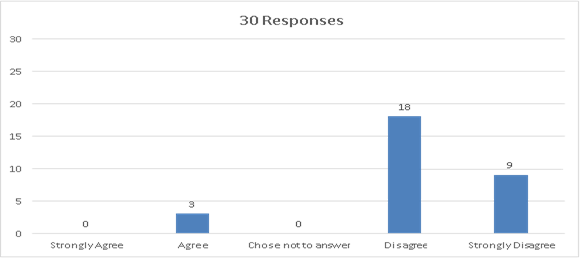
When respondents were also asked to express their opinion on whether in Bangladesh women actually enjoy their right to equality before the law, in total, the majority (90%) of the respondents disagreed. From Figure 2 we can see that 60% disagreed with the statement that women get equal treatment before the law and another 30% strongly disagreed. On the other hand, only 10% of the respondents agreed with the statement. As a result, we can see that there are still a few who believe women have the right to equality with men in the society.
Figure 3: Do you think the citizens of the country are properly aware of the rights of women?
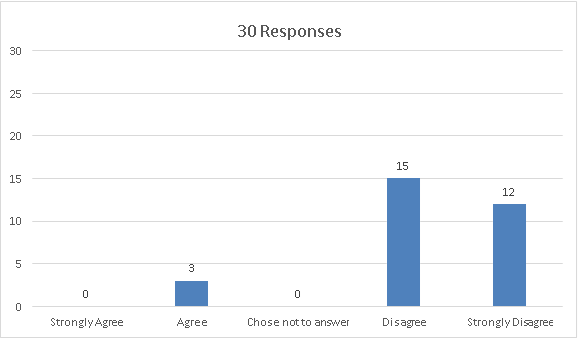
Respondents were requested to give their opinion on whether they think the citizens of the country know much about women’s rights. In that regard, Figure 3 presents that 40% individuals strongly believe that people are ignorant about the fundamental rights of women and what they involve. There are 50% who moderately believe that people are not educated about women’s rights. As opposed to the large number of opinions in disagreement, only about 10% of individuals agree with the statement.
Figure 4: Since in Bangladesh, women make up half the country’s citizens, do you think the empowerment of women is necessary to cope with the modern world?
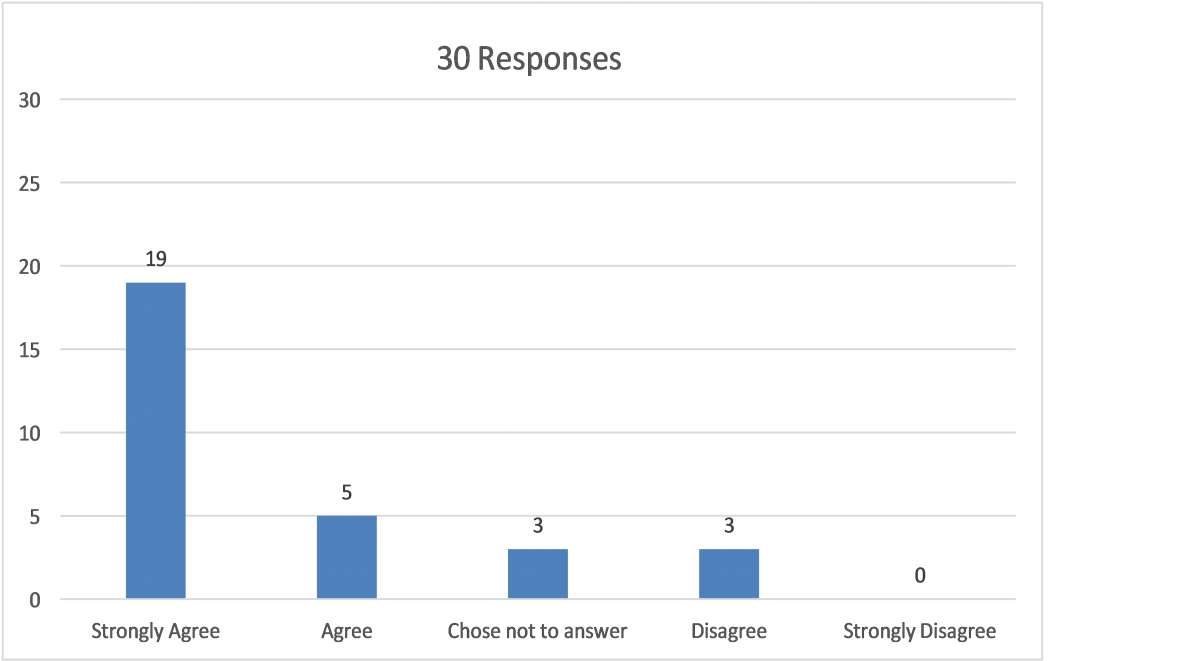
One of the most important questions of this survey, in my opinion, was to ask the respondents whether they believe the empowerment of women is necessary to cope with the fast pace of the modern world. In response, 65% provided strong affirmation. An additional 15% think it is essential, while only 10% were opposed to the suggestion. 10% of the respondents neither agreed nor disagreed.
Figure 5: Do you believe women should have a non-discriminatory access to justice?

The majority answered in agreement to women having non-discriminatory access to justice. A total of 75% strongly agreed with an additional 15% moderately agreeing. An interesting fact is that nobody disagreed. Furthermore, 10% denied to answer.
Figure 6: Do you think women of the country can access legal proceedings the same way as men?
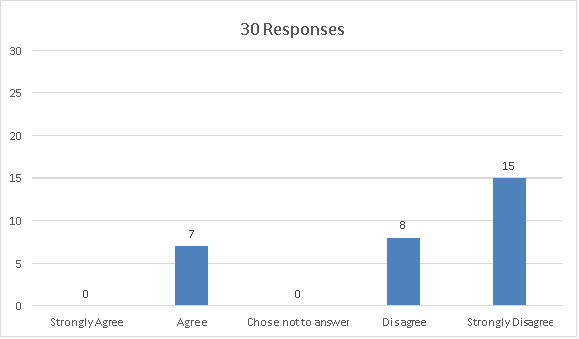
According to Figure 6, a total of 75% of respondents think that women do not have the same access to legal proceedings as men. In contrast, 25% think they do have equal access to law.
Figure 7: Do you believe women should have effective access to remedies when their rights have been violated?
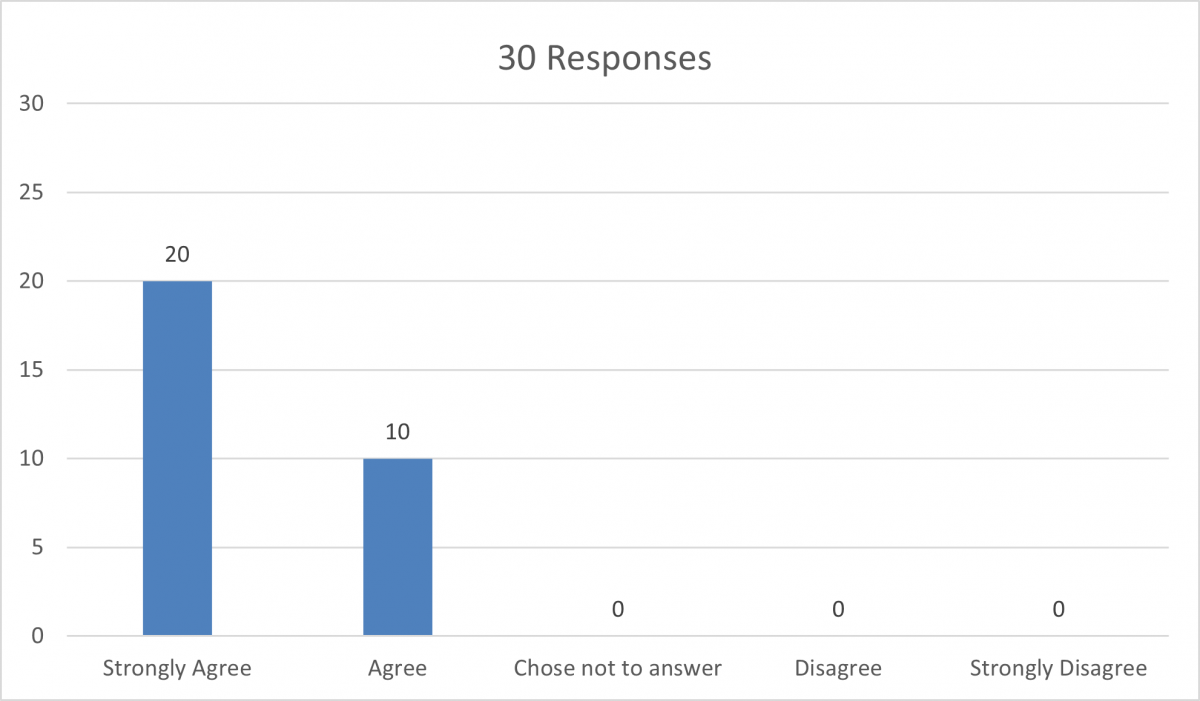
This survey question was asked regarding whether access to proper remedies should be ensured by the legal system in case women’s fundamental rights are in violation. From Figure 7 we can see that all 100% of the respondents responded positively towards the statement. Collectively all believed that women and men are equally deserving of appropriate remedies when their rights are violated. About 65% of the respondents strongly agreed with the statement, while the remaining 35% moderately agreed. So, Figure 7 shows that most of the legally conscious citizens of Bangladesh believe that it is an out-and-out key to provide women with their justified rights to ensure gender equality.
Figure 8: Do you think our current legal system successfully provides remedies to the contemporary needs of women?

Respondents were also asked to expose their view as to whether the remedies provided by our legal system are successful at attending the present-day needs of women. As Figure 8 shows, 25% of respondents discreetly agreed with the statement, while a total of 65% of respondents were conflicted to accept this statement and disagreed with the notion. As a result, 40% strongly believe our legal system fails to provide appropriate solutions to women’s legal needs and 25% moderately disagree with the statement. 10% of the respondents remained neutral by choosing not to answer.
Figure 9: Do you think proper access to justice and empowerment of women with equal rights can be a solution to our country’s socio-economical backlogging?
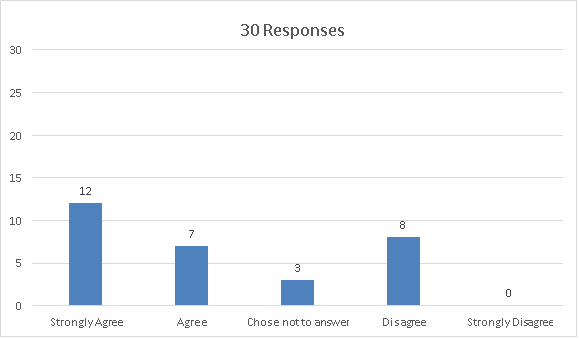
The final question has elicited a mixed opinion from all the respondents. While a total of 65% think access to justice and empowerment of women is a solution to our problems, 25% think the solution is in something else. 10% were not sure what side to take and they refrained from answering.
When we examine what is meant by “fair and equitable justice,” we discover that it gives the defendant and plaintiff sufficient time to present their cases and to refute the defendants’ arguments, it is completed within a reasonable time frame, it involves processes and expenses that are reasonable given the nature of the situation, and the outcome is fair for both parties[1]. But unfortunately, this access to justice comes second-hand to womenfolk and more often the process is lengthy, costly, discriminate and ineffective.
Additionally, today’s modern development is largely based on the topic of women’s empowerment. It emphasizes the idea that women are active contributors to development, rather than passive beneficiaries of its results. Indeed, national freedom and growth remain a long way off without empowering women, who make up half of the world’s population. The complete and effective participation of women in political, economic, social, and cultural life is made possible through empowerment, which gives women the strength and self-assurance to take charge of their own lives and actions. It gives women the confidence to seek equality in their interactions with males in their homes and society at large. Evidence suggests that empowering women contributes to the development of inclusive, free, and affluent societies.[2]
5.1 Access to justice and existing laws in Bangladesh
In Bangladesh, several articles in the supreme law indirectly emphasize the access to justice. Article 27 of the Bangladesh constitution states “All citizens are equal before the law and are entitled to equal protection of the law”[3]. According to Article 14, emancipating underprivileged groups of the population from all types of exploitation is the state’s fundamental obligation. Article 31(2) confirms that every citizen has an inalienable right to the protection of the law and to be treated in accordance with law. Article 35(3) ensures speedy and fair trial. Article 26 of the constitution confirms that any segment of law that is in conflict with any fundamental right is void. Though no explicit definition of “access to justice” is provided, these articles discuss it indirectly.
5.2 Reasons behind the deprivation of women’s right to access to justice in Bangladesh
Access to justice is greatly hampered due to various causes. The massive cost of court proceedings is one of those. In developed nations such as the USA, the legal costs may not be a complex and expensive concern, but in Bangladesh, fees for lawyers, travel costs, net positive daily wages, costs of collecting evidence, and various legal expenses are unreasonable for women. Because most women are not financially independent in Bangladesh, in a case where one party is poor and the other is wealthy, the equality, rule of law, and fair trial protections guaranteed by the Bangladeshi constitution and other international documents cannot be upheld because the wealthy party is able to hire a skilled attorney who can easily win the case for his clients while the opposing attorney fails to do so. On a related note, corruption in the legal system has recently increased significantly. Fines have also risen. Bribing court personnel and even opposing lawyers can sometimes be a deciding factor in the disposition of cases. According to a survey on corruption in Bangladesh’s judiciary, 52.4% of the accused or plaintiffs said they had to bribe court staff[4]. Aside from that, additional fees to affiliates and others are included which a women cannot afford.
Further, court fees, processing fees, advocate fees, and other incidental costs also prevent women from accessing justice.
From a Bangladeshi standpoint, procedural complications in the processing of cases are critical. Because not everyone is capable of dealing with court procedures, they must depend on lawyers and representatives. For women, the complication that arises most often is that the lawyers and staff cost far more than the bare minimum to handle these cases.
The real test is also conducted once the legal process has begun. Take the Prevention of Women and Children Repression Act of 2000 as an example. We are aware that this law is a blessing for women. They are very effectively receiving a lot of remedies under this Special Act. The frequency of torture against them has lessened as a result of resolving all prior issues. But the unfortunate problem is that despite the law’s requirement that judgment be rendered within 180 days, obtaining justice takes a very long time. In case the judge of the Tribunal is transferred before the completion of the adjudication, the judge replacing the former shall proceed from the stage of the adjudication on which the former was transferred and he need not to examine the witness again whom the former already examined.[5] We know that an appeal can be made under section 18. After passing the order passed by the Tribunal, the party who is not satisfied may appeal to the High Court Division within 60 days from the date of passing the order.
One must therefore rush to the High Court for the case’s ruling after suffering the weight of the litigation. Not all women in Bangladesh are autonomous, and their families may not be wealthy enough to support them for an extended period of time. Therefore, it becomes difficult for them to go back to the High Court after dealing with the annoyance of the tribunal for 180 days. Yes, there is a legal requirement to file an appeal after a decision has been made, but most women are not accustomed to it. We have observed in numerous statutes that a case may be affected in any ongoing state after being filed. This, in my opinion, is a serious legal flaw.
The length of time is another obstacle for the women to get the right to access to justice. It takes a long time to resolve a civil lawsuit in Bangladesh. In Bangladesh, it usually takes several years to resolve a civil lawsuit, but poor litigants often lose everything after only a year or two of litigation and are unable to move the case. As a result, the court issues a ruling in favour of the powerful party.
According to statistical data on the institution and disposition of civil cases in the Appellate Division of the Supreme Court 2007, 4,376 civil cases remained pending from the previous year, out of a total of 6,324 cases. There were 936 criminal cases pending out of a total of 1,517.
Most importantly, many citizens of the nation are unaware of women’s rights. According to my survey, roughly about 90% believe people are ignorant about the fundamental women rights and the practice. As a result, women are unable to protect their rights without any legal support[6].
In Bangladesh, women make up about 50% of the population, yet their status is far lower than that of men. In the home, the workplace, and society as a whole, women experience prejudice and abuse. Married women in Bangladesh have little control over their bodies and are not completely aware of their own sexual and reproductive rights. The decisions made by a woman’s spouse and his family regarding sexual activity, birth control, pregnancy, prenatal care, and abortion are hers. Additionally, many pregnant women receive inadequate care, inadequate nutrition, and neglectful medical attention. In actuality, maternity-related problems account for around 37% of all fatalities of women in reproductive age.
A little over 47% of Bangladeshi women report having been physically abused by their intimate partners. The number would be far greater if psychological violence were included. In Bangladesh, more than 10 women experience acid attacks every week that leave them horribly deformed and frequently blind and crippled[7].
According to a survey conducted in Bangladesh, 32% of women who work outside the home report having their work interrupted by instances of domestic abuse[8]. Around 400 million people in South Asia suffer from hunger, which accounts for nearly 40% of all people living in poverty worldwide. Due to gender-discriminatory behaviors, an estimated 50 million women are currently “missing” from the population[9]. In India, Bangladesh, and Pakistan, discrimination and neglect account for one out of every six infant deaths involving a female. Domestic violence, rape, sexual assault, incest, trafficking, honour killings, acid attacks, public mutilation, stove-bullrings, and forced temple prostitution are examples of culture-specific types of violence[10].
All in all, women are not fully in practice and unfortunately in most cases not even aware of their fundamental human rights such as to right to life, education, vote, wages, health and so forth.
5.3 Findings
1. The relationship between access to justice and the rights of the women goes hand-in-hand. When women are delayed and/or denied access to justice similarly to men, they are also getting deprived of the enjoyment of their fundamental rights as human beings.
2. The main obstacles that are keeping women from enjoying their right to access to justice are the traditional and cultural negative views about women’s rights, the absence of an accountable and transparent authority.
3. Existing age-old procedural and substantive laws are also liable behind the deprivation of women’s right to access to justice.
4. Lack of awareness among the women regarding their legal rights is a vital cause behind the denial of women’s right to access to justice.
5.4 Recommendations
To ensure access to justice, first we need to take a look into the common problems.
Firstly, vulnerable women cannot always afford to pay court costs. Legal aid is a significant factor in easing cost pressures. There is no sufficient legal aid service in Bangladesh. This is a critical issue because otherwise, many of those who are ideally entitled to services from government lawyers may receive poor quality representation or face lengthy delays. To tackle this problem, I suggest that all courts should provide legal aid. Legal aid should not be limited to individuals classified as poor, but should embrace a broader income range. Additionally, those who cannot afford to pay for legal aid should receive it for free, and there should be a sliding scale of contributions for those who can.
Secondly, Complementary methods, such as Alternative Dispute Resolution processes must be prioritized in order to establish the rule of law and ensure access to justice. NGOs could perhaps boost the effectiveness of justice procedures by providing disputants with prompt, clear, and sincere assistance.
Thirdly, developing witness and victim protection programs is also important to ensuring access to justice.
Fourthly, the virtual judiciary system should be continued to ensure women’s right to access to justice.
5.5 Conclusions
One of the most fundamental factors affecting women’s status in society is their legal rights. While there are a number of legislations protecting women’s rights in Bangladesh, these have always failed to advance their position. Undoubtedly one of the most crucial goals of a democratic nation is access to justice. Ordinary people anticipate that the court will deliver justice in the hopes of gaining access to justice through the court, but in Bangladesh access to justice is not adequately carried out due to a number of issues.
This study has found that the high cost of legal processes severely restricts access to justice. Legal fees, travel expenditures, net positive daily salaries, costs associated with gathering evidence, and other related charges are disproportionately high for women in Bangladesh compared to other developed nations.
Moreover, access to justice includes both providing justice in a timely manner and to all persons who seek justice through the judicial system. This study also found that in Bangladesh, women are unable to obtain justice due to prohibitive legal expenditures, which include court fees, processing fees, advocate fees, and other miscellaneous expenses.
Further problems lie in the inadequacies and inefficacy of laws, women’s barriers to easy participation in judicial proceedings, traditional and culturally ingrained prejudices against women’s rights, and the lack of a transparent and accountable authority. Regarding the scope and amount of liabilities for violating laws intended to protect full and equal and special rights, the current legal system has a serious deficiency. The research found that another significant problem with the nation’s current legal system is the lack of any impartial administrative authority to check on the application of the law.
Furthermore, it was found that, due to a lack of adequate education and skills, Bangladeshi women are only marginally involved in profitable corporate activities or political endeavors. Despite impressive advances in female education and gender parity in elementary and secondary schools, high dropout rates and poor educational quality remain major challenges. Furthermore, women and girls continue to face numerous healthcare deficiencies, particularly in rural areas. Reports from other industries demonstrate pay disparities between men and women, regardless of the fact that this is illegal.
Last but not least, to face these ongoing issues, this paper has found a few options for solutions. Complementary techniques, such as Alternative Dispute Resolution processes, should be prioritized in order to establish the rule of law and ensure access to justice. NGOs can improve the quality of justice procedures by providing disputants with timely, transparent, and respectful assistance.
Legal aid should be made available. Greater responsibility must be established for policy, lawyers, and the judiciary. Case management techniques must be carefully developed and implemented. Developing witness and victim protection programs is also critical to ensuring access to justice. As a progressive society committed to women’s rights and empowerment, we must all show our support and cease considering culture solely as a barrier and impediment to their achievements.
For a list of references, click HERE.
Authors: Dr. Syeda Afroza Zerin, Associate Professor, Department of Law, American International University-Bangladesh and Lutfunnessa Sagor, PhD fellow, Géza Marton Doctoral School of Legal Studies, University of Debrecen
[1] Nadim Zawad Akil, (Dhaka Tribune Online, September 19, 2021), <https://archive.dhakatribune.com/opinion/op-ed/2021/09/19/op-ed-does-everyone-have-access-to-justice> [Accessed 14 August, 2022].
[2] Md Mustafizur Rahman, ISAS Insights- Detailed perspectives on developments in South Asia, <https://www.isas.nus.edu.sg/papers/the-empowerment-of-women-in-bangladesh-not-just-rhetoric> [Accessed 14 August, 2022].
[3] Article 27 of the Bangladesh constitution, also see: The Daily Star Archive, (Wednesday July 03, 2003), <http://archive.thedailystar.net/2003/07/23/d30723020325.htm> [Accessed 14 August, 2022]
[4] Article: Overview of corruption within the justice sector and law enforcement agencies in Bangladesh, <https://www.u4.no/publications/overview-of-corruption-within-the-justice-sector-and-law-enforcement-agencies-in-bangladesh.pdf> [Accessed 14 August, 2022].
[5] The Prevention of Women & Children Repression Act, 2000
[6] Denning, Lord, What new the Laq, Butterwords, London, 1982
[7] Acid Survivors Foundation 2003
[8] UNFPA 2003
[9] Sen 2003
[10] UNIFEM 2003